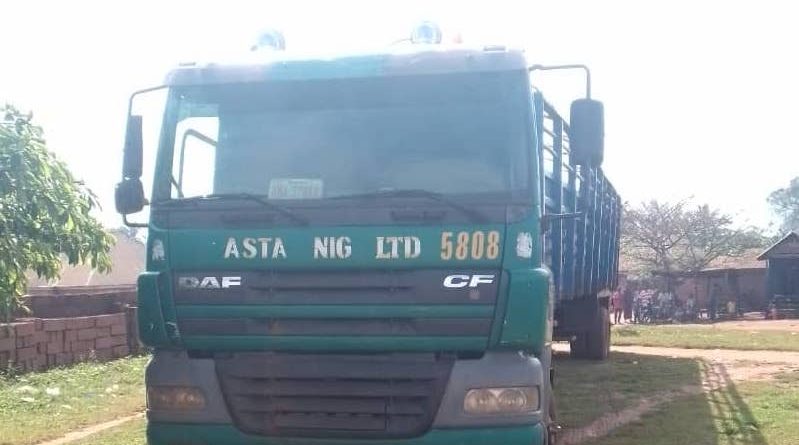How trucks crushed mining company worker on Kogi’s dangerous mining road
Tragedy struck in Ankpa Local Government Area of Kogi State on Sunday morning when Victor Braimah, a staff member of Zuma 828 Coal Limited, was crushed to death by two coal-laden trucks along the Enjema–Okobo mining route.
Mr Braimah, who worked as a foreman in the company’s Technical Services Department, was riding his motorcycle to work around 9 a.m. when the accident involving two heavy-duty trucks with registration numbers LSR-69YM (Lagos) and KNA-378XA (Kogi), occurred.
Witnesses told our reporter that the deceased, a father of six, was riding behind a trailer leaving the Enjema coal depot when thick clouds of dust from the unpaved road, raised by the vehicle, blinded his vision.
“He tried to overtake to escape the dust but ran into a deep pothole and fell,” Hamza Mohammed, witness said. “Before he could rise, another truck coming from Okobo crushed him.”
According to Mohammed, the first truck driver, hearing people shout, stopped abruptly and reversed — unknowingly climbing over the victim a second time.

Mr Braimah’s remains were later deposited at the Ankpa General Hospital mortuary, while both drivers and their trucks were detained at the Enjema Police Division for investigation, according to police and community sources.
Multiple witnesses who spoke on condition of anonymity described the fatality as “avoidable”. They blamed it on the deplorable state of the road, worsened by years of heavy mining traffic.
“From Enjema to Okobo, the road is a death trap,” a security source who requested anonymity said. “Erosion has affected it badly. The dust blinds everyone — drivers, bikers, and even pedestrians.
“He was suffocating from the dust raised by the truck. When he tried to overtake, he hit a pothole and fell under the trailer that crushed him,” a community member said.
When contacted, Austine Chigozie, the Assistant Chief Security Officer of Zuma 828, confirmed the incident.
“All I can say is that he had an accident with a truck on his way to work on Sunday,” he said. “The police were alerted, the two truck drivers were arrested, and the trucks taken to the station.”
He identified the deceased as Mr. Victor Braimah, adding that he worked as a foreman in the company’s Okobo office.
“His relatives from Edo State have been to the police and the mortuary. Arrangements are ongoing to convey his remains to his home state, Edo,” he said.
Staff anger over company’s response
Meanwhile, anger is reportedly brewing among workers over what some described as the company’s “cold and insulting” response to the tragedy.
According to sources, Innocent Ezuma, the company’s CEO, approved only ₦300,000 as financial support for transporting the deceased’s remains — a gesture that sparked outrage among staff members.

“We were shocked,” a staff member said. “He worked here for years, managing all the heavy equipment — excavators, tractors, trucks. ₦300,000 is what they think his life is worth? It’s an insult.”
Our reporter sent detailed questions to Mr Ezuma, the CEO of Zuma 828 Coal Limited, regarding the alleged ₦300,000 support offer, the company’s staff welfare policy, and road safety measures along the Enjema–Okobo corridor.
READ ALSO: FG plans to ban overloaded petrol trucks
As of the time of filing this report, Mr Ezuma had not responded to calls, text messages, or WhatsApp inquiries sent to his line.
The Enjema–Okobo road has long been a death trap; a vital artery for coal trucks and company vehicles neglected by both Zuma 828 and the Kogi State Government.
The dusty, erosion-ravaged stretch has claimed several lives over the years, locals say, but mining operations continue daily with nothing tangible done to fix it.
“Now, even their own workers have become victims of the same systemic neglect,” a resident of the area lamented.
“We have written letters, we have begged,” said a youth leader from Okobo. “The trucks pass every hour, but no one cares until another life is lost.”
Mr Braimah’s death has reignited anger among locals and workers alike, who describe it as a tragic symbol of the human cost of coal — and of a system where even the lives of employees are expendable in the race for profit.
Community leaders in the area have accused Zuma 828 and other coal companies of failing to honour their Community Development Agreements (CDAs), leaving communities without schools, water, or health centres — and without safe roads.

